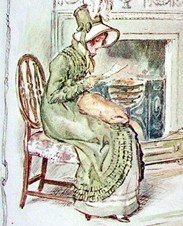“the tame, decorous expression of Romantic ideals”
In this issue, Foundation volunteer Delicia Johnson explores Anne Elliot as a Romantic character.
Whether Austen’s writings belong to the Enlightenment, or the Romantic movement is a contentious topic in academic circles. Writing between 1787-1817, Jane Austen was writing during a period of shift from Enlightenment ideals to those of Romanticism.
Romanticism is an artistic and intellectual movement that embraces the importance of feelings and the imagination, love of nature and rejection of urban life, anti-establishmentism, individualism, and idealism. Romanticism grew out of dissatisfaction with the Age of Enlightenment, which honored reason above all.
“Elegant ladies walking on a country road near a farmyard,” painted by Hendrik Pieter Koekkoek during the Romantic Movement. Creative Commons license
In her book A Revolution Almost beyond Expression: Jane Austen’s Persuasion, Dr. Jocelyn Harris argues that Persuasion is indeed a Romantic novel, whilst Marilyn Butler in Jane Austen & The War of Ideas characterizes Persuasion as staunchly anti-Romantic and a product of Augustan values. With its emphasis on reason, restraint, and order, Augustan characteristics are the polar opposite of Romanticism’s predominance of emotion.
There is much to say about Romanticism in Austen’s Persuasion, such as her Wordsworthian descriptions of the English countryside, the idealism and debatable Byronic qualities of Captain Wentworth, Louisa Musgrove’s sensibility, and Captain Benwick’s appetite for Lord Byron and Walter Scott. However, I will focus on Anne Elliot’s Romantic characteristics.
Anne Elliot, Persuasion 1909
I argue that Anne Elliot exemplified ‘Quiet Romanticism’, a term I use to define a type of Romanticism that includes, but is not limited to, the expression of feeling with deference to rationalism and propriety; reverence for nature, appreciation of the arts, sense of responsibility to humankind, desire for solitude in order to better understand one’s internal and external worlds, and mild democratic ideals. It is the tame, decorous expression of Romantic ideals. I assert that Anne Elliot is, indeed, one of Austen’s ‘quiet Romantics.’
One of the hallmark characteristics of Romanticism is a reverence for nature. Anne Elliot's dread of the “white glare of Bath'' demonstrates a negative view of urbanity that was common with most Romantics. Anne’s admiration for nature is most unveiled during the walk to Winthrop. Her musings read like a Romantic ode to nature:
Hedge garden where ladies would have exercised
“Her pleasure in the walk must arise from the exercise and the day, from the view of the last smiles of the year upon the tawny leaves and withered hedges, and from repeating to herself some few of the thousand poetical descriptions extant of autumn, that season of peculiar and inexhaustible influence on the mind of taste and tenderness, that season which has drawn from every poet, worthy of being read, some attempt at description, or some lines of feeling.”
Anne’s impassioned, internal dialogue rivals the exquisite poetical descriptions she references and shows a deep Romantic admiration for nature.
Solitude is another major characteristic of Romanticism. Throughout the novel, Anne seeks solitude to process her emotions. When she is overcome by Captain Wentworth moving her nephew off her back, she seeks solitude to recover. She yearns for solitude after hearing a discussion between Captain Wentworth and Louisa Musgrove in regard to her refusing Charles Musgrove’s proposal. After reading Captain Wentworth’s heartfelt letter, she acknowledges that “such a letter was not to be soon recovered from” and, again, she longs for solitude and reflection.
Captain Wentworth’s Letter, Persuasion 1909
Like other Romantics, Anne does find pleasure in company. However, she needs to retreat in order to fully understand herself, analyze her personal responses, and seek truth about her experiences and the world around her.
There is no implication that Anne has absolutely no regard for the social hierarchy or that she has any radical beliefs as many of the Romantic thinkers did. However, despite being a baronet’s daughter, she is one of the few characters to resist the pride of rank. Her judgment of others is in accordance with their character and not their rank.
For example, she finds little to admire about her cousins, Dowager Viscountess Dalrymple and the Honourable Miss Carleret. She describes them as having “no superiority of manner, accomplishment, or understanding.” Because of their titles, Lady Russell still thinks their acquaintance is worth having. Mr. Elliot, with his great value for rank and connections, also believes them to be good company. His definition of good company in this instance being equated with rank.
Anne Elliot returns, “My idea of good company, Mr. Elliot, is the company of clever, well-informed people, who have a great deal of conversation; that is what I call good company.”
Sally Hawkins as Anne Elliot, 2007
Anne is one of the few characters in Persuasion to dismiss pride of rank, “I certainly am proud, too proud to enjoy a welcome which depends entirely upon place.”
Anne renews her acquaintance with her former governess, Mrs. Smith, who is now a poor widow and cripple and living in very humble circumstances and is excluded from society. Sir Elliot is aghast that his daughter could enjoy such a companion, especially when she refuses to cancel her engagement with Mrs. Smith in order to see Lady Dalrymple. Sir Elliot demeans Mrs. Smith for being one of thousands of Smiths (i.e. not being from a notable, aristocratic family), old, sickly, and poor. In short, Sir Elliot with his aristocratic prejudices, deems Mrs. Smith to be an unworthy person for his daughter to associate with. For Anne, Mrs. Smith’s worthiness is in the compassion that Mrs. Smith showed to her whilst she grieved for her mother.
Moreover, although briefly tempted by the idea of being “Lady Elliot” and restored to Kellynch, Anne ultimately follows her heart and marries a man without land or title, forming a democratic union based on love.
Ultimately, it’ll be up to readers to decide how ‘Romantic’ Persuasion and its heroine are. Certainly, my own partiality for Romanticism and its poets has influenced my interpretation. However, I believe that Anne Elliot’s pining for the “sweet scenes of autumn” does connect her more with John Keats than Alexander Pope even if it’s ever so quietly.
© Delicia Johnson 2023. Residing in the United States, Delicia Johnson has been a volunteer for the Jane Austen Literacy Foundation since 2016. She is currently the Foundation’s lead administrator. A few of her major duties include processing bookplate orders and administering the annual writing competition. She’s worked as a library assistant for nearly eight years and serves as a blogger for the Jane Austen Summer Program. She enjoys reading, watching British period dramas and tv series, writing, and learning everything she can about eighteenth century England.
#Literacy2023
Join the fun of our 30 Day Literacy Challenge. This year’s challenge is inspired by the classics, but you don’t need to have read the classics to play along.
See our daily challenges on the Jane Austen Literacy Foundation Facebook and Instagram pages, and answer in the comments, or do your own posts (including #literacy2023).
Join Caroline Jane Knight in-person this October for the last night of Salthouse Creative’s comedic and creative reimagining of Sense & Sensibility at The Library at The Dock in Melbourne, Australia.
Only 30 tickets available for this exclusive one-off event, starting at 5pm on Friday 13th October:
Meet Caroline at a private event before the show with drinks and canapes
Listen to a talk from Caroline on Sense & Sensibility
Front row seat at the performance
Exclusive gift bag (valued at $110)









